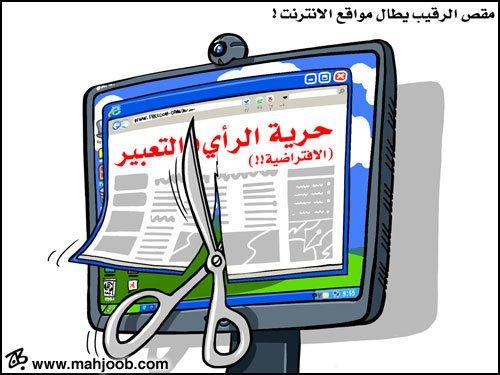Earlier today, 7iber.com published an article that I had contributed regarding the inclusion of internet websites under the definition of the press and publication law.
You can view the article in its original location here. Or, alternatively, continue to read it in this same post:
Websites and the Publication Law: The Hour’s Reality and What Should have Happened Instead
Perhaps the talk of the moment in the Jordanian blogosphere is the decision of the Court of Cassation of Jordan (also known as the Supreme Court) 1to categorize Internet websites as a type of “publication” thus extending the controversial Press and Publication Law to govern websites as well. The decision was met with fierce opposition in the Jordanian Blogosphere; the Jordanian free and alternative media was now to be under the same governing legislation that many believe brought Jordan’s traditional media to its supposed demise. Indeed, it is a common view that the Press and Publication Law restricts journalists in exploring alternative news sources, as well as voicing their opinions freely in editorials.
The Court’s ruling, however, occurred in a different light. The ruling was a result of a court case by journalist Ahmad Salameh, currently an advisor for the crown prince of Bahrain, against Samir al-Hiari and Sakher Abu `Antara, who operate Internet news websites, over a case of public defamation. 2
(See Ammon’s article on Salameh’s case against Omar Kallab, listing Salameh’s accusations against Mr. Kallab as well as the Ammon website: http://www.ammonnews.net/article.aspx?articleNO=13047)
The ‘Press and Publication Law’ provides clear anti-defamation codes for journalists, and thus was used by Salameh to argue for his case. In that case, the writers as well as the editor-in-chief of the publication are accountable; and false information or personal attacks on individuals are prohibited. The court ruled in favor of the plaintiff, and the verdict was appealed until reaching the Court of Cassation, which had to establish whether the basis of the case was lawful to begin with, and thus, establish whether the Press and Publication Law can be a governing document for articles on the internet.
Supporters of the ruling also view ramifications in the same light: writers on the internet are accountable to what they say, baseless attacks are prohibited, and information integrity is promoted.
While such view is well-founded, supporters are perhaps oblivious to the other ramifications of using the law as it stands to websites. For instance, the law prohibits writings offensive to religion, prophets, or other people, which might prove to hinder some of the healthy debate going on.
(View the Entire text of the Press and Publication Law in Arabic in its current form here: http://www.lob.gov.jo/ui/laws/search_no.jsp?no=8&year=1998 (Law initially passed in 1998, with major amendments in 2007))
Additionally, concerning questions come to mind; if a website is found to contain writings or expressions that are contrary to the Press and Publications Law, what happens? Are the writers held accountable? Or will the internet-equivalent of forcing a periodical to cease publication—website blocking—be implemented (which would be horrible, to say the least)?
Laws that limit personal attacks as well as offensive statements are not exclusive to Jordan, however. Anti-defamation jurisdictions are actually internationally accepted; Article 17 in the United Nations International Covenant on Civil and Political Rights, for instance, explicitly refers to defamation:
- No one shall be subjected to arbitrary or unlawful interference with his privacy, family, or correspondence, nor to unlawful attacks on his honour and reputation.
- Everyone has the right to the protection of the law against such interference or attacks.
The problem in Jordan, however, is that defamation law is closely tied to the press, media, and publications, and the prohibition of defamation occurs primarily in the Press and Publication Law. Thus, when people like Ahmad Salameh took a defamation case to court, the case’s success was contingent on the characterization of internet websites as “publications” and recognizing them as falling under the controversial Press and Publication Law.
When viewed in that light, the ruling seems like a well-intentioned move to allow integrity to extend to the Internet, as well as the extending rights of citizens for protection from attacks on their image to apply on the Internet. The problem is, as mentioned before, other stipulations arise due to remaining portions of the law.
Personally, what I think would have been a better alternative, was to emphasize that defamation is a crime independently, irrelevant to the realm of media, the press, or publications. This is actually what most countries have in place; laws stress that if false claims producing a negative image are communicated to any person other than the defamed himself, the defamed has the right to seek retraction and/or compensation.
The reason I think a better alternative is to stress only on anti-defamation laws is because: their negative implications are narrower, yet they guarantee the personal right of protection against defamation on a broader scale. For instance, if one is to send several letters to CEOs claiming that individual XYZ is fraudulent, then it should be the right of individual XYZ to seek retraction and compensation, despite the fact that such defamation occurred in communications that are not categorized as “publications”. Similarly, a person’s own writings on the internet form a natural extension of his own communicated claims, and thus in the event of the defamation, a person can seek retraction naturally.
Extending anti-defamation laws to the internet is natural, and does happen in European countries and the United States (albeit with minor stipulations). It is based on the simple expectation that what you do in the “cyber world” is entailed by what you do in the “real world”.
Reserving individuals’ rights for protection against false claims and attacks on reputation in the internet is highly important. However, such protection of rights should not be done in the frame of media, press, and publication legislation, as that would hinder the openness of the web as we know it.
References
- kinghussein.gov.jo/government4.html#The%20Judicial%20Branch
- alghad.com/?speical_section=81&news=476677
- alghad.com/?news=476359
- alghad.com/?news=476631
- en.wikipedia.org/wiki/Defamation
